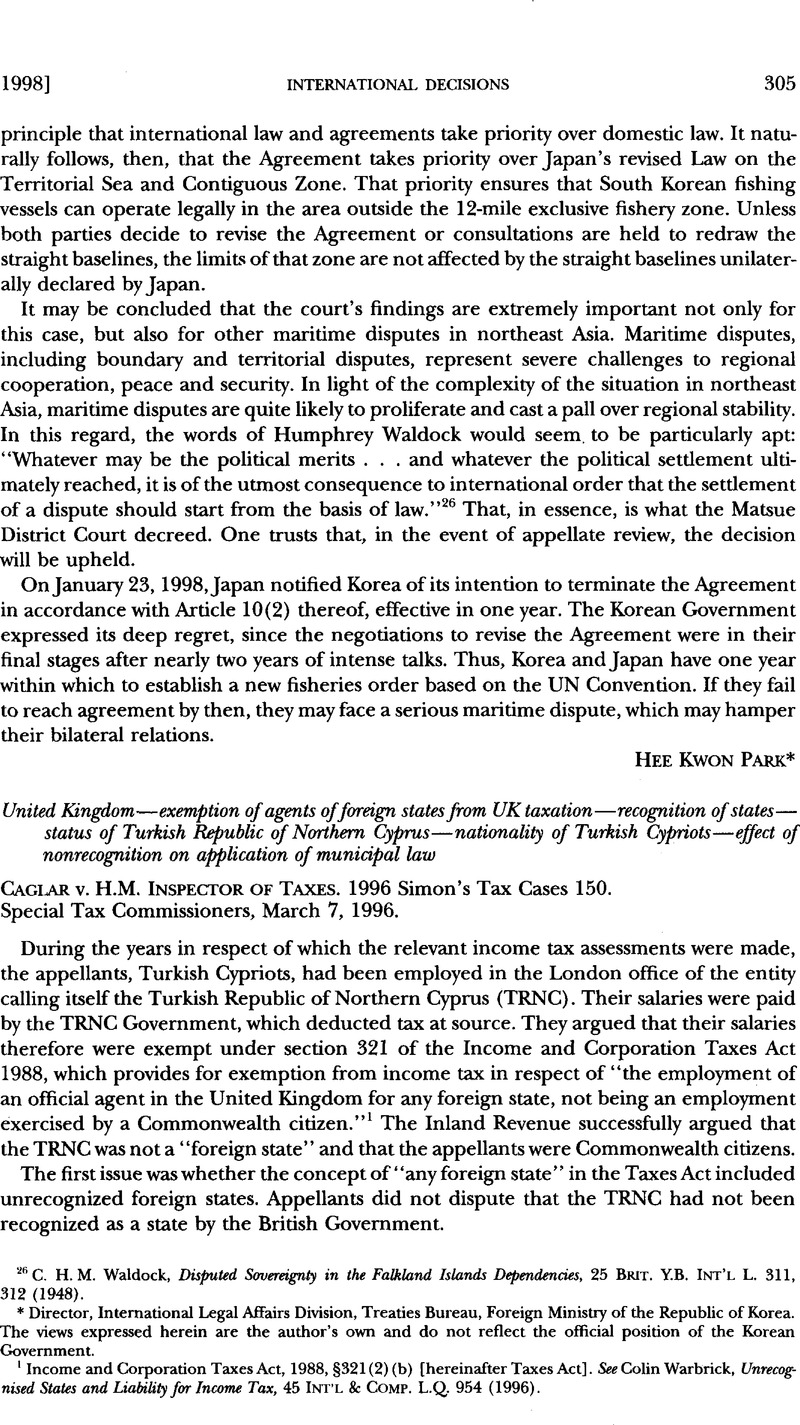Published online by Cambridge University Press: 27 February 2017

1 Income and Corporation Taxes Act, 1988, §321 (2) (b) [hereinafter Taxes Act]. See Colin, Warbrick, Unrecognised States and Liability for Income Tax , 45 Int’l & Comp. L.Q. 954 (1996)Google Scholar.
2 [1986] 3 W.L.R. 583.
3 Id. at 588. Steyn, J., went on to remark that “recognition . . . is a matter of foreign policy on which the executive is in a markedly superior position to form a judgement.” Id. The conclusiveness of a Foreign Office certificate as to British recognition or otherwise of any entity is stipulated in §21 of the State Immunity Act 1978, ch. 33 (for the purposes of that Act).
4 150 S.T.C., para. 121 [hereinafter Caglar]. The wording is borrowed practically verbatim from the proposition of Donaldson, M.R., in GUR, [1986] 3 W.L.R. 583, 595.
5 Caglar, para. 122.
6 Id., paras. 148, 150.
7 Id., para. 148. The “other immunities and exemptions” referred to were primarily the “general law of sovereign immunity,” involving consideration of the Diplomatic Privileges Act 1964 (§4 of which provides for certification by the Foreign Secretary as to “whether or not any person is entitled to any privilege or immunity under this Act,” such certification to be conclusive evidence of the facts stated therein), the Consular Privileges Act 1968 (§11 of which is in exactly the same terms as §4 of the Diplomatic Privileges Act), and certain provisions of the 1988 Taxes Act (§§320–322 of which provide exemptions for official agents of Commonwealth countries and self-governing colonies, subject to certification by a High Commissioner). The one and only case in which the statutory words “foreign state” had been interpreted to include unrecognized states arose under §24 of the Patents Act. Re Al-Fin Corporation’s Patent, [1970] 1 Ch. 160 (the unrecognized entity in question was the People’s Democratic Republic of Korea). It was distinguished on the grounds that “ [i]n that case the issue concerned the private rights of the patentee and the decision had no effect on the foreign entity.” Caglar, para. 106.
8 [1978] 1 Q.B. 205.
9 Id. at 218.
10 Caglar, paras. 111, 121. The same distinction was applied to Reel v. Holder, [1981] 3 All E.R. 321; and Polly Peck Int’l plc v. Nadir, [1992] 2 Lloyd’s Rep. 238. It is noteworthy that, while the latter case actually involved the TRNC, the most that Scott, L.J., was prepared to say on the issue was that “Northern Cyprus is not recognised by Her Majesty’s Government but nonetheless has had de facto control over its territory since about 1974.” Id. at 240. See Caglar, paras. 109–11, 114–18.
11 Caglar, para. 144.
12 Id., para. 151.
13 As set out in Article 1 of the Montevideo Convention on Rights and Duties of States, Dec. 26, 1933, TS No. 881, 165 LNTS 19.
14 Caglar, para. 168 (emphasis added). In paras. 166–67, the commissioners make an interesting reference to a passage in John Dugard, Recognition and the United Nations 60–64 (1981), where the latter discusses the position of the so-called Bantustans and disagrees with a South African judicial decision to the effect that
where a state had the infrastructure to implement relations with other states it was a state even if it was precluded from entering into such relations due to political considerations. Professor Dugaard [sic] disagreed with this view which, he said, was out of touch with reality; there had to be both formal independence and functional independence.
Caglar, para. 167.
15 Caglar, para. 179.
16 Section 37(1) of the British Nationality Act 1981 provides that any person who is a citizen of a country listed in schedule 3 to the Act, in accordance with any law for the time being in force in that country, shall have the status of a Commonwealth citizen. The Republic of Cyprus is listed in schedule 3 to the Act, and the appellants in the instant case were citizens of the Republic of Cyprus under Article 198 of the 1960 Constitution of Cyprus and under the Republic of Cyprus Citizenship Law (No. 3 of 1967). The commissioners, taking these matters into account, declined to inquire into the validity of acts of the recognized Cypriot Government. Caglar, para. 217.
17 Caglar, para. 186.
18 Id., paras. 187–88.
19 Id., para. 191.
20 See note 16 supra. The principal authorities cited by the commissioners were Luther v. Sagor, [1921] 3 K.B. 532, and The Vapper, 80 Lloyd’s List L. Rep. 99 (1947).
21 Caglar, para. 231.
22 See Rosalvn, Higgins, Problems and Process: International Law and How We Use It, ch. 7 (1994)Google Scholar.
23 Caglar, para. 244.
24 See, e.g., the commissioners’ misinterpretation of Case C-432/92, Regina v. Minister of Agriculture, Fisheries and Food, ex parte S.P. Anastasiou (Pissouri) Ltd., 1994 ECR 1–3087, to the effect that the TRNC had in that case been treated as a “competent authority” of the Republic of Cyprus for the purpose of certifying the origin of imported fruits and vegetables pursuant to European law, thereby assimilating it to the position of Ciskei in GUR Corp., [1986] 3 W.L.R. 583, or East Germany in Carl Zeiss Stiftung v. Rayner & Keeler Ltd. (No. 2), [1967] 1 App. Cas. 853, whereas the TRNC could not in any circumstances be regarded as a subordinate or delegated authority of the Republic of Cyprus.